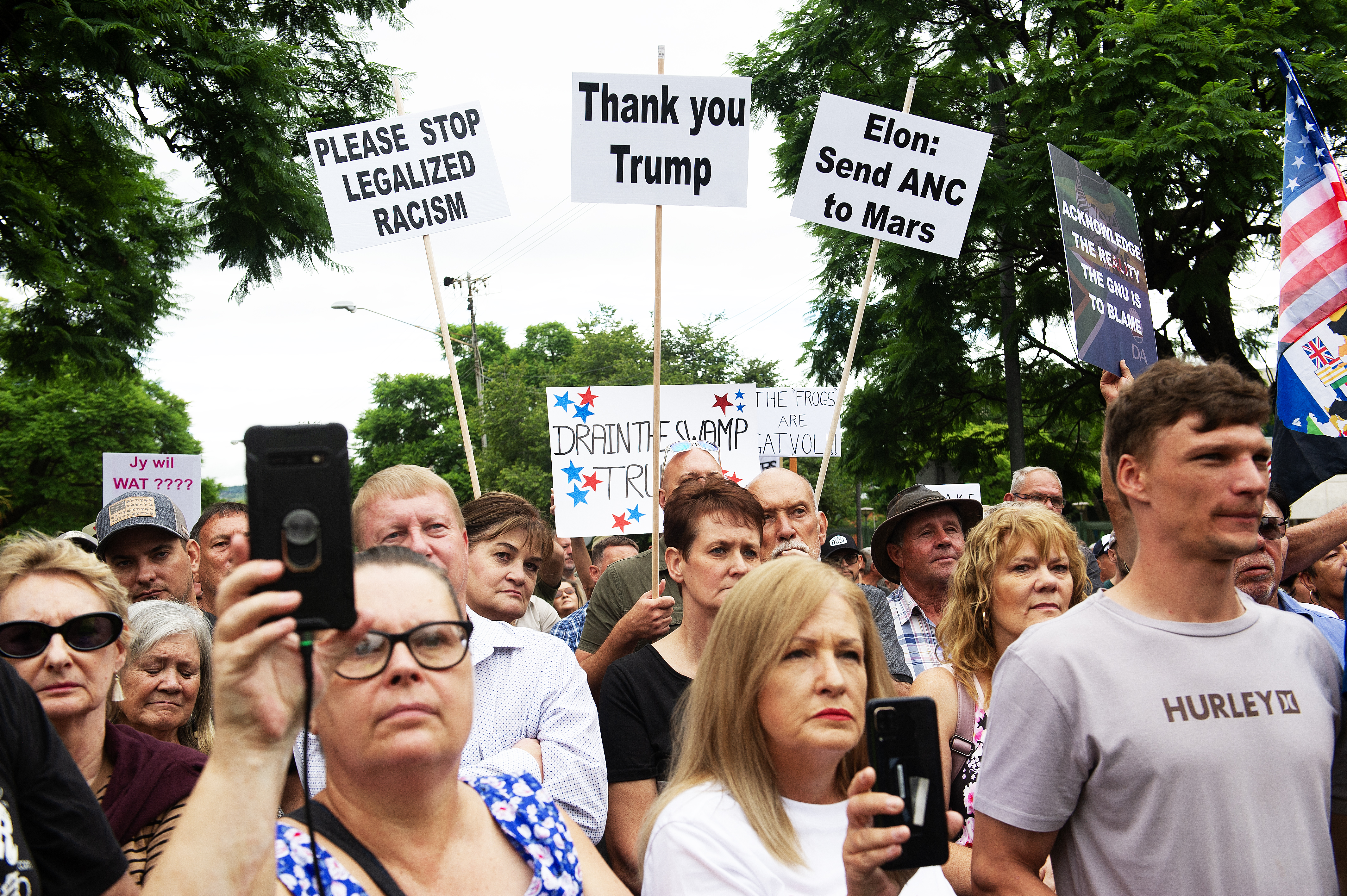Armed with signs that read “Refuge Please” and “Thank you, Trump. We are coming”, scores of Afrikaners descended on the US Embassy in Pretoria on Saturday, 15 February.
The purpose of the rally was to hand over a memorandum on farm murders and a list of what they believe are racial laws against white South Africans, but above all, the gathered crowd wanted to show their appreciation to re-elected US President Donald Trump for what they viewed as standing up for Afrikaners and inviting them to go to the US as refugees.
 Afrikaners kneel and pray during a gathering at the US Embassy in Pretoria on 15 February 2025. (Photo: Gallo Images / Rapport / Elizabeth Sejake)
Afrikaners kneel and pray during a gathering at the US Embassy in Pretoria on 15 February 2025. (Photo: Gallo Images / Rapport / Elizabeth Sejake)
On 7 February, Trump signed his 58th Executive Order since coming back into office, effectively stripping South Africa of all US aid and offering refugee status to Afrikaners. The order accused SA of “government-sponsored race-based discrimination, including racially discriminatory property confiscation” and a “shocking disregard of its citizens’ rights”.
It specifically singled out Afrikaners for resettlement in the US because of a narrative pushed by Afrikaner rights groups, AfriForum and Solidarity, which claim white South Africans are persecuted as a result of “racist laws” like BBBEE, the Land Expropriation Act as well as the disproved “white genocide”.
Despite being the ones who set these recent events in motion, both AfriForum and Solidarity have emphatically turned Trump down on his offer of refuge. However, the showing outside of the US Embassy in Pretoria revealed that there is some interest in Trump’s offer of greener pastures.
Potential delays
While an executive directive is in place and Trump has seemingly given Afrikaners an open invitation to the US, the practical implementation of the order could stagnate as a result of logistical challenges.
Even though Trump signed the Executive Order on Addressing Egregious Actions of The Republic of South Africa, it does not mean the refugee process is already in motion.
According to the American Civil Liberties Union (ACLU), some executive orders take longer to come into effect than others. Take the order cutting foreign aid which was put into effect immediately, for instance.
The order empowers Secretary of State Marco Rubio and Secretary of Homeland Security Kristi Noem to create a plan that will facilitate the resettlement of Afrikaners through the United States Refugee Admissions Program (Usrap) to be submitted to Trump and the Homeland Security Advisor. No plan has been drawn up thus far.
The lack of a plan may or may not have something to do with the fact that on 20 January, the US president signed an executive order suspending Usrap, the exact vehicle that would allow for the settlement of the “Afrikaner refugees” and effectively instituting an indefinite ban of refugees.
If you can look beyond the fact that Trump has indefinitely dismantled Usrap, you can put together a picture of what Trump’s Afrikaner refugee programme could look like based on the US historical refugee admissions process, which can take 18-24 months.
First, an aspirant refugee would primarily have to get a referral letter from the United Nations High Commissioner for Refugees (UNHCR), but can also get a letter from US embassies, certain senior US government officials, certified NGOs and Welcome Corps private sponsors (group of five or more US citizens or lawful permanent residents).
Granted, the executive order suspending Usrap does allow officials to make case-by-case exemptions to the refugee admissions freeze. However, the latest figures from the US State Department show that most refugees accepted into the US refugee programme hail from countries plagued by war, serious ethnic strife and repression of minority groups.
In the interview with the refugee officer, the would-be refugee would have to make a very compelling case about why they are applying for refugee status. This means real, hard evidence that their lives are in danger, and would continue to be in danger, if they stayed in South Africa.
Read more: Trump, Musk and the fabricated persecution of South African Afrikaners
Had Trump offered asylum status instead of refugee status, the immigration process would have been relatively less complicated. Some of the major differences are that asylum seekers can apply for protection while already in the US (all they would need is a visa, plane ticket and proof of persecution).
Additionally, unlike the 18-24 month refugee application process, the US Citizenship and Immigration Services (USCIS) states the average asylum process takes 180 days from the day the application is filed.
Farewell, SA
Karen-Lee Pollak, an immigration attorney and managing attorney at Pollak PLLC, said that refugee applicants typically had to explain their life and persecution in their country of origin in detail.
“You should have documents evidencing proof of your persecution or fear of persecution as well as unabridged birth and marriage certificates, divorce decrees, military records and certified copies of criminal records, if any, as well as any other evidence that will assist you in being classified as a refugee,” Pollak said.
In the case that the refugee application is approved after a battery of medical tests to screen for physical or mental disorders and severe substance abuse, Afrikaner refugees should be prepared to say goodbye to South Africa forever.
Pollak said that a refugee’s status can be put in jeopardy if they travel back to the country which they fled out of fear for their lives or fear of future persecution. DM




 Afrikaners kneel and pray during a gathering at the US Embassy in Pretoria on 15 February 2025. (Photo: Gallo Images / Rapport / Elizabeth Sejake)
Afrikaners kneel and pray during a gathering at the US Embassy in Pretoria on 15 February 2025. (Photo: Gallo Images / Rapport / Elizabeth Sejake)